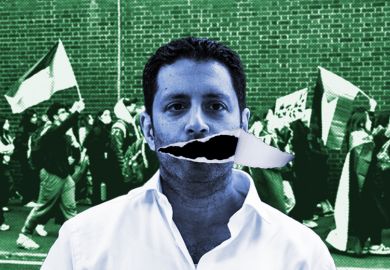No one questions that free speech is particularly important on university campuses. England’s Office for Students rightly notes that robust debate is essential to advancing new ideas and addressing complex societal issues.
As educator-scholars in human rights and conflict management, we have witnessed how fear of backlash or controversy stifles meaningful dialogue. Social media echo chambers have followed students into lecture halls, reinforcing their narrow worldviews and making them extremely sensitive to having those views challenged.
A particularly unfortunate concomitant of this reluctance to engage with challenging perspectives is selective empathy, whereby we can only see the suffering of people who look like us, talk like us or are perceived to think like us (whoever “us” is). This perpetuates dehumanisation and threatens our ability to work together to tackle today’s complex global challenges.
Hence, we welcome last month’s decision by England’s education secretary Bridget Phillipson to press ahead with the implementation of the Higher Education (Freedom of Speech) Act, subject to some minor exceptions. This controversial law received Royal Assent in May 2023 and was due to come into force last August as part of the previous Conservative government’s “anti-woke agenda”. However, the new Labour government postponed it amid concerns that it could protect harmful rhetoric and endanger the safety of minority communities.
The act requires English universities to promote free speech and establish policies that support academic freedom. It also mandates the creation of a “free speech champion” – the director for freedom of speech and academic freedom at the Office for Students – charged with monitoring cases of no platforming and dismissals of academics for expressing controversial views.
While discussions around the appropriateness and prudence of this act will certainly continue, its implementation provides an opening for universities to reframe free speech not as a licence for harmful rhetoric but as a tool for fostering understanding, mutual respect and human dignity.
Engaging students in respectful discourse is a civic obligation for universities, but it involves not just protecting the right to protest but educating students about the responsibilities that accompany free speech. Students must be taught how to navigate disagreement constructively and with dignity. We as educators have a role to teach these skills and to ensure we embody them ourselves.
Universities must implement policies that unequivocally reject dehumanising language and actions – whether targeting ethnic groups, refugees, immigrants, people with minority gender identities or anyone else. We must recognise the intrinsic value of all individuals, irrespective of race, religion, nationality, socioeconomic status or any other defining characteristic. Without it, Darfur, Kigali, Kfar Aza, Srebrenica or Gaza are just some recent examples of how we can descend into persecution, genocide or crimes against humanity.
We must also ensure that our universities do not tolerate the range of additional ways that hatred can manifest, including bullying, harassment, verbal abuse or insults, disinformation, threats or calls for violence, and violence proper.
To these ends, universities must provide students with opportunities to develop critical thinking, tolerance and resilience. They also need to help students learn how to interact with other points of view and understand how their own behaviour impacts others, without feeling that they’re conceding or betraying their cause.
Students must learn respect and how to manage friction; this is critical preparation for living in a complicated, nuanced and interconnected world. Flashpoints will arise but they should not be seen as mistakes or defeats but, instead, as lessons in growth.
Universities’ obligations regarding free speech go beyond mere compliance with the law. They amount to a mission to nurture a generation of students who are prepared to face the complexities of a deeply polarised world with compassion, endurance and dignity.
So let those of us at English universities use the implementation of the Freedom of Speech Act to dedicate ourselves to this mission, creating environments where free speech and respect go hand in hand.
This is a crucial moment, and we must act on it.
Carla Ferstman is professor of law at Essex Law School and director of the Essex Human Rights Centre. Faten Ghosn is professor and head of the department of government at the University of Essex.
Register to continue
Why register?
- Registration is free and only takes a moment
- Once registered, you can read 3 articles a month
- Sign up for our newsletter
Subscribe
Or subscribe for unlimited access to:
- Unlimited access to news, views, insights & reviews
- Digital editions
- Digital access to THE’s university and college rankings analysis
Already registered or a current subscriber?








